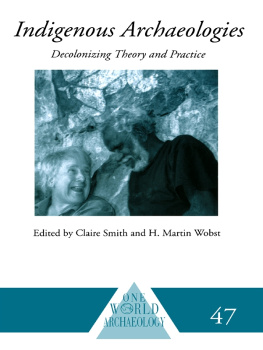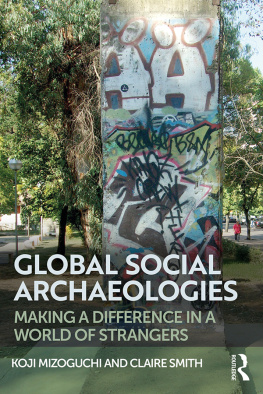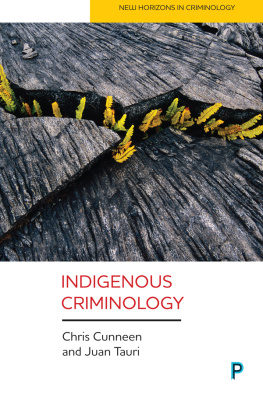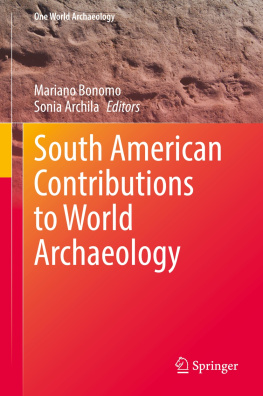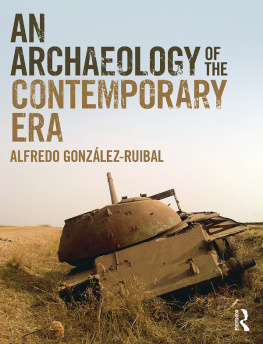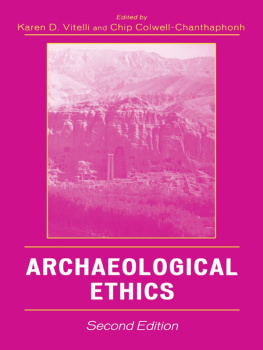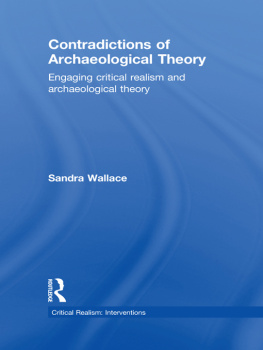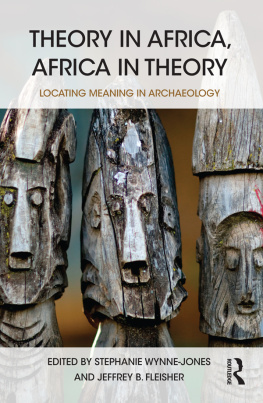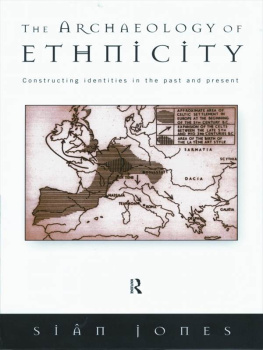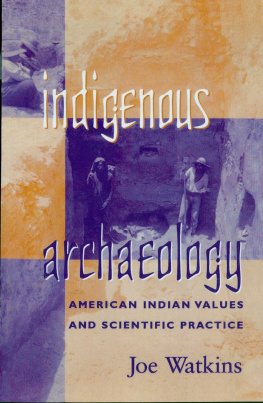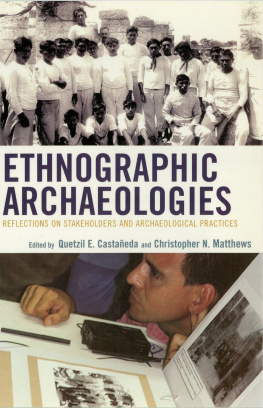The One World Archaeology (OWA) series stems from conferences organized by the World Archaeological Congress (WAC), an international non-profit making organization, which provides a forum of debate for anyone who is genuinely interested in or has concern for the past. All editors and contributors to the OWA series waive any fees they might normally receive from a publisher. Instead, all royalties from the series are received by WAC Charitable Company to help the wider work of the World Archaeological Congress. The sale of OWA volumes provides the means for less advantaged colleagues to attend World Archaeological Congress conferences, thereby enabling them to contribute to the development of the academic debate surrounding the study of the past.
The World Archaeology Congress would like to take this opportunity to thank all editors and contributors for helping the development of world archaeology in this way.
ONE WORLD ARCHAEOLOGY
Series Editor (Volumes 137): Peter J.Ucko
Academic Series Editors (Volume 38 onwards): Martin Hall and Julian Thomas
Executive Series Editor (Volume 38 onwards): Peter Stone
1. What is an Animal?, T.Ingold (ed.)
2. The Walking Larder: Patterns of domestication, pastoralism and predation, J.Clutton-Brock
3. Domination and Resistance, D.Miller, M.J.Rowlands and C.Tilley (eds)
4. State and Society: The emergence and development of social hierarchy and political centralization, J.Gledhill, B.Bender and M.T.Larsen (eds)
5. Who Needs the Past? Indigenous values and archaeology, R.Layton (ed.)
6. The Meaning of Things: Material culture and symbolic expression, I.Hodder (ed.)
7. Animals into Art, H.Morphy (ed.)
8. Conflict in the Archaeology of Living Traditions, R.Layton (ed.)
9. Archaeological Heritage Management in the Modern World, H.F.Cleere (ed.)
10. Archaeological Approaches to Cultural Identity, S.J.Shennan (ed.)
11. Centre and Periphery: Comparitive studies in archaeology, T.C.Champion (ed.)
12. The Politics of the Past, P.Gathercole and D.Lowenthal (eds)
13. Foraging and Farming: The evolution of plant exploitation, D.R.Harris and G.C.Hillman (eds)
14. Whats New? A closer look at the process of innovation, S.E.van der Leeuw and R.Torrence (eds)
15. Hunters of the Recent Past, L.B.Davis and B.O.K.Reeves (eds)
16. Signifying Animals: Human meaning in the natural world, R.G.Willis (ed.)
17. The Excluded Past: Archaeology in education, P.G.Stone and R.MacKenzie (eds)
18. From the Baltic to the Black Sea: Studies in medieval archaeology, D.Austin and L.Alcock (eds)
19. The Origins of Human Behaviour, R.A.Foley (ed.)
20. The Archaeology of Africa: Food, metals and towns, T.Shaw, P.Sinclair, B.Andah and A.Okpoko (eds)
21. Archaeology and the Information Age: A global perspective, P.Reilly and S.Rahtz (eds)
22. Tropical Archaeobotany: Applications and developments, J.G.Hather (ed.)
23. Sacred Sites, Sacred Places, D.L.Carmichael, J.Hubert, B.Reeves and A.Schanche (eds)
24. Social Construction of the Past: Representation as power, G.C.Bond and A.Gilliam (eds)
25. The Presented Past: Heritage, museums and education, P.G.Stone and B.L. Molyneaux (eds)
26. Time, Process and Structural Transformation in Archaeology, S.E.van der Leeuw and J.McGlade (eds)
27. Archaeology and Language I: Theoretical and methodological orientations, R.Blench and M.Spriggs (eds)
28. Early Human Behaviour in the Global Context, M.Petraglia and R.Korisettar (eds)
29. Archaeology and Language II: Archaeological data and linguistic hypotheses, R.Blench and M.Spriggs (eds)
30. Archaeology and Anthropology of Landscape: Shaping your landscape, P.J.Ucko and R.Layton (eds)
31. The Prehistory of Food: Appetites for change, C.Gosden and J.G.Hather (eds)
32. Historical Archaeology: Back from the edge, P.P.A.Funari, M.Hall and S.Jones (eds)
33. Cultural Resource Management in Contemporary Society: Perspectives on managing and presenting the past, F.P.MacManamon and A.Hatton (eds)
34. Archaeology and Language III: Artefacts, languages and texts, R.Blench and M.Spriggs (eds)
35. Archaeology and Language IV: Language change and cultural transformation, R.Blench and M.Spriggs (eds)
36. The Constructed Past: Experimental archaeology, education and the public, P.G.Stone and P.Planel (eds)
37. Time and Archaeology, T.Murray (ed.)
38. The Archaeology of Difference: Negotiating cross-cultural engagements in Oceania, R.Torrence and A.Clarke (eds)
39. The Archaeology of Drylands: Living at the margin, G.Barker and D.Gilbertson (eds)
40. Madness, Disability & Social Exclusion: The archaeology & anthropology of difference, J.Hubert (ed.)
41. Destruction and Conservation of Cultural Property, R.L.Layton, P.G.Stone and J.Thomas (eds)
42. Illicit Antiquities: The theft of culture and the extinction of archaeology, N.Brodie and K.Walker Tubb (eds)
43. The Dead and their Possessions: repatriation in principle, policy and practice, C.Fforde, J.Hubert and P.Turnbull (eds)
44. Matriel Culture: The archaeology of 20th century conflict, J.Schofield, W.G. Johnson and C.M.Beck (eds)
45. Natural Disasters and Cultural Change, R.Torrence and J.Grattan (eds)
46. Archaeologies of the British: Explorations of Identity in the United Kingdom and its Colonies 16001945, Susan Lawrence (ed.)
47. Indigenous Archaeologies: Decolonizing theory and practice, C.Smith and H.Martin Wobst (eds)
First published 2005 by Routledge 2 Park Square, Milton Park, Abingdon, Oxon OX14 4RN
Simultaneously published in the USA and Canada by Routledge 270 Madison Ave, New York, NY 10016
Selection and editorial matter 2005 Claire Smith and H.Martin Wobst; individual chapters 2005 individual contributors
All rights reserved. No part of this book may be reprinted or reproduced or utilised in any form or by any electronic, mechanical, or other means, now known or hereafter invented, including photocopying and recording, or in any information storage or retrieval system, without permission in writing from the publishers.
We dedicate this book to the Indigenous people who have suffered from colonialism, and to a decolonized future. We also dedicate it to Annette and James Smith and to Margarete and Helmut Wobst.

